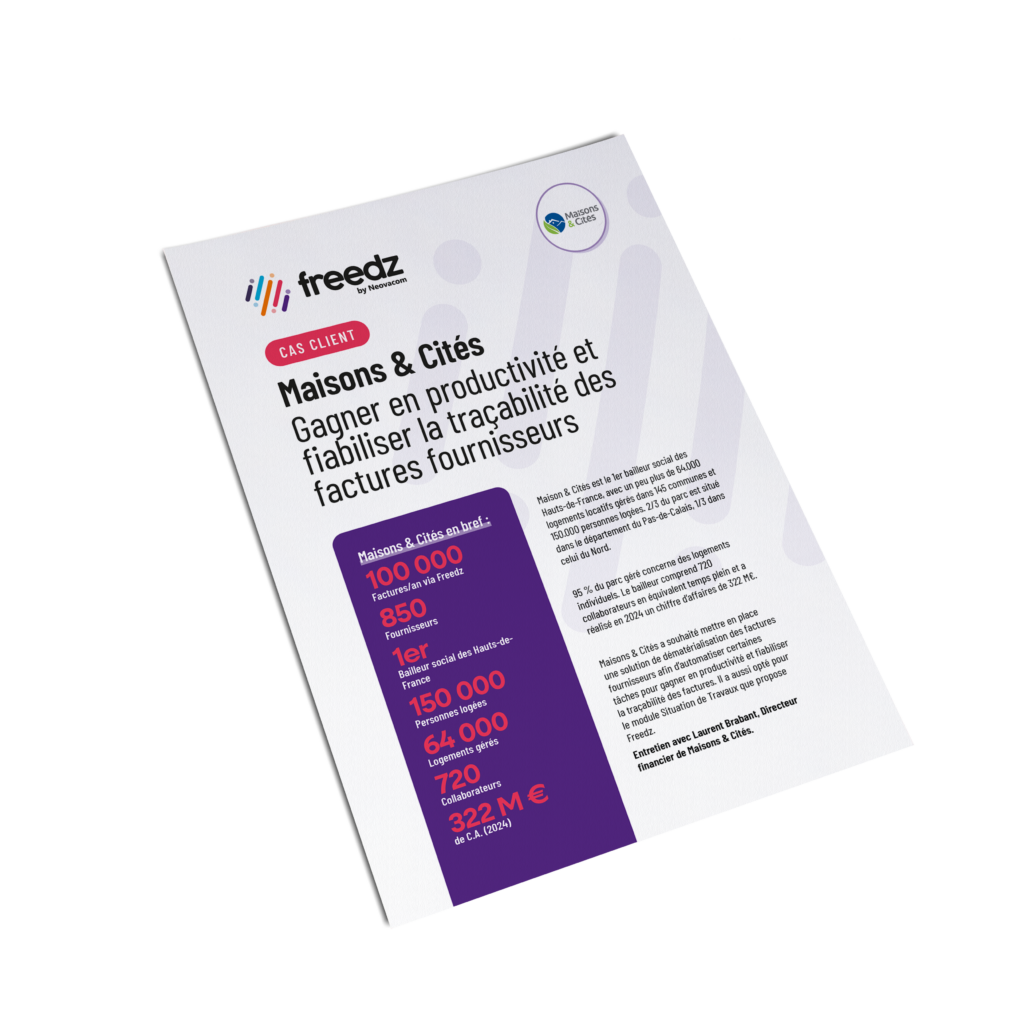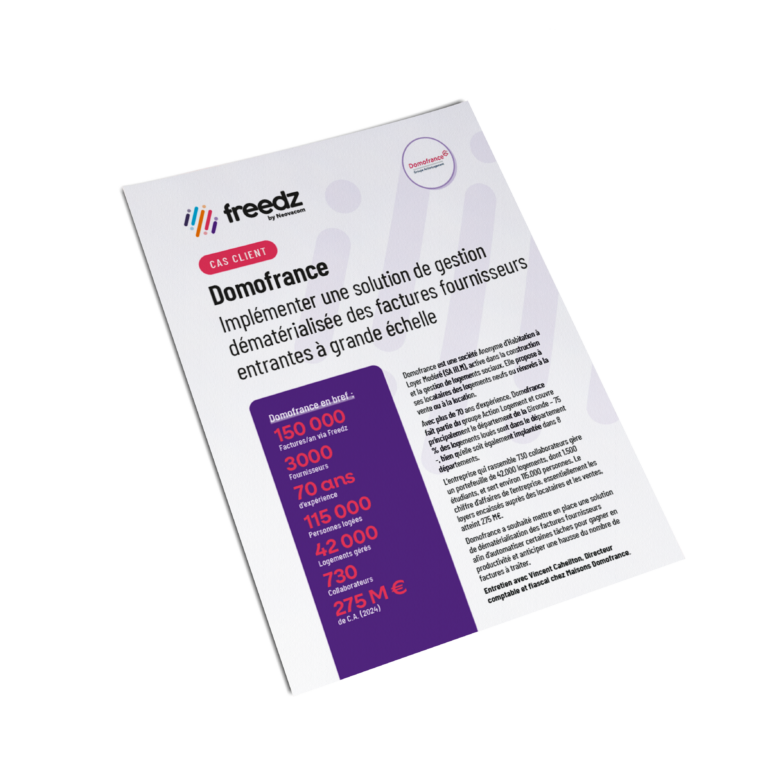Maisons & Cités
Improve productivity and traceability of supplier invoices
Maison & Cités is the No. 1 social landlord in the Hauts-de-France region, with just over 64,000 rental units in 145 municipalities and 150,000 residents. 2/3 of the housing stock is located in the Pas-de-Calais département, 1/3 in the Nord département.
95% of the housing stock managed consists of single-family homes. The landlord employs 720 full-time equivalent staff and generated sales of €322 million in 2024.
Maisons & Cités wanted to implement a solution for the dematerialization of supplier invoices, in order to automate certain tasks, increase productivity and ensure reliable invoice traceability. It also opted for Freedz's Situation de Travaux module.
Interview with Laurent Brabant, CFO of Maisons & Cités.
What was your initial problem?
We manage 100,000 invoices a year with 850 active suppliers, which is a large volume. Before using the Freedz platform, we received all our suppliers' invoices by post, with the original in paper format. We used Automatic Document Reading (ADR) and Automatic Document Recognition (ADR) software, then scanned the documents and manually integrated them into our ERP system. An aging solution and a very time-consuming process. We had to find a solution to dematerialize all our invoices. What's more, we also had in mind the reform of electronic invoicing, scheduled to come into force at the time in 2024.
What drove you to take the step?
Rather than updating an outdated process, we decided to comply with future regulatory and tax obligations, by choosing a dematerialization tool for invoices that would enable us to benefit from a number of advantages: document traceability, a reliable audit trail, no longer having to manage and store paper documents, and of course huge time savings!
How was the project set up?
Very good. We set up a project team with an IT consultant on one side and an accounting consultant on the other. On the other side, Neovacom's teams and Customer Success Manager helped us gradually to implement the solution. I have to say that the challenge was considerable, since we chose to switch over our entire process in one fell swoop, without any transition!
How did your suppliers adapt?
Everything went smoothly, as we communicated extensively. What's more, some suppliers already had experience of Chorus... In addition, they were keen to have a dematerialized solution for tracking the status of their invoices.
We wanted a "locked" solution, meaning that no company can now submit invoices without a commitment number on the purchase order. In the end, when we receive an invoice today, we can be sure that the document has gone through a locked validation circuit, rather than the way it used to be, where we might receive invoices for which the order had not always been placed, or had not been placed correctly.
What has Freedz done for you?
The first gain is the improvement of the audit trail, i.e. there is a real traceability of what is received. Today, if a supplier calls us to be paid, we know exactly where his invoice is, whether it has been deposited, and if so, where it is in the workflow. For example, we no longer waste time trying to locate an invoice sent to one of our branches, since everything is centralized! And there's no more paper waste...
Today, we've cut our average supplier payment time by a fortnight - a huge saving on a company-wide scale! We also estimate that we have achieved at least 20% productivity gains, and gained the equivalent of one full-time job. As a result, our accounting staff can concentrate on higher value-added tasks. They have greater control over the accounting entries made when recording invoices, as well as the VAT rates applied to certain property work services. Last but not least, we now have much better quality documents. As our suppliers themselves submit their documents, they are native documents, no longer transformed by an optical scanner.
Why did you also choose the work situation management solution?
This was a prerequisite when we put out our call for tenders to dematerialize incoming invoices. We were looking for a solution that could do everything, which is what Freedz can do. We have a large volume of work, which means that a project manager may have to manage 2 or 3 operations simultaneously. It could therefore happen that he would only send us the progress reports for the various sites once a month. As a result, there was no exact match between the progress of the works and what we received to validate the invoices as they went along.
We no longer have any problems of this kind. As soon as we receive the architect's approval of the site's progress, we trigger payment to the construction companies, without further delay. As a result, we know in real time where the site stands. This makes our work easier, and we enjoy a good relationship with the builders, since everything is transparent. We make it a point of honor to have the shortest possible payment deadlines. For the companies who work with us, it's a guarantee that they'll be paid on time.
How is the company anticipating the regulatory obligations of 2026-2027 linked to the reform of electronic invoicing?
Very serenely. It's not really an issue for us any more, since we use a platform approved by the DGFiP as a Partner Dematerialization Platform. And we're very happy that we don't have to start a new project, with a new solution to find. What's more, all the comments we made during the test phase were heard and taken into account by Neovacom.
What would you say to a company hesitating to adopt a solution like Freedz?
We'd tell him not to wait to take the plunge. The dematerialized supplier invoice management solution and the management of work situation invoices have enabled us to gain in efficiency and improve our relations with our suppliers. It's a win-win partnership: if you take the time to set up the project properly, the solution works very well.

Download this case study as a PDF
How Freedz helps its customers' management
From administration and finance to IT and real estate, our customers tell us why they chose Freedz.
RATP Habitat – Manage incoming billing with a single point of entry and eliminate paper formats
Logeo Seine – Responding to a sharp increase in incoming invoices and preparing for reform
